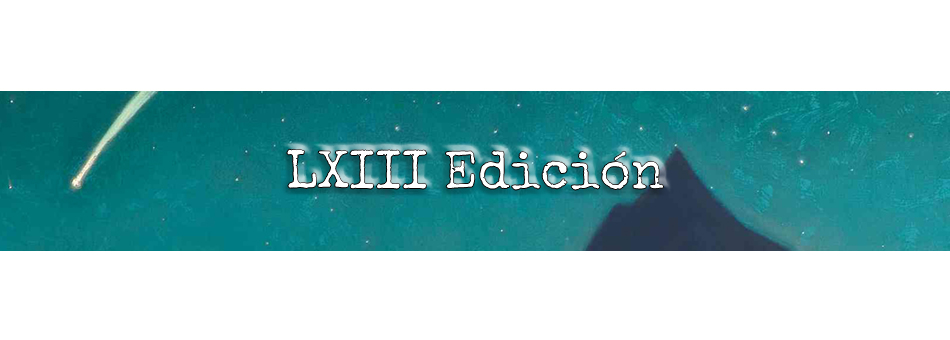LXIII Edición: Temporada de lluvias

Primera parte e introducción a la colección
Cinco poemas de Erín Mouré traducidos del inglés que son, a su vez, traducciones del portugués de los poemas de Alberto Caeiro.
Agradecemos a Erín Mouré y a la editorial Anansi por permitir la publicación.
XX El Humber es realmente maravilloso
El Humber es más chingón que el arroyo debajo de mi calle.
Y el Humber no es más chingón que el arroyo que corre debajo de mi calle.
Es imposible confundirlos si los miras desde aquí;
por eso, ninguno de los dos es muy grande…
El Humber es muy pequeño para los barcos.
Aún así, es navegable para aquellos
que ven siempre lo que “no está”:
surge el recuerdo de las canoas.
El Humber desciende desde el norte
y el Humber entra en el lago Ontario.
La gente habla de esto por la tardes en los autobuses.
Pero pocos hablan del arroyo que corre cerca de mi calle;
¿ni de hacia dónde se dirige? ¿ni de dónde viene?
Y así, sólo porque pertenece a menos gente,
el arroyo de mi calle es más grande y es más libre.
Puedes ir en el Humber casi hasta las cataratas del Niágara;
más allá del Humber están los gringos,
esos que hacen las fortunas.
Nadie piensa nunca en lo que hay más allá
del arroyo que corre bajo Winnett.
El arroyo cerca de mi calle no pone a pensar a la gente en nada.
Quien llega a su orilla sólo ha llegado a la banqueta.
XXVI A veces en días de nítida y perfecta luz
A veces, en días de luz perfecta y precisa
donde las cosas gozan de toda la realidad que pueden tolerar,
me pregunto amablemente
¿Por qué incluso yo atribuyo belleza a estas coisas?
¿Tiene belleza una flor cualquiera?
¿Una fruta al azar?
No, tienen color y forma
y, si acaso, existencia.
La belleza es el nombre del terror que apenas podemos soportar.
Oops, ese es un poema de Rilke.
La belleza es el nombre de una chose inexistente,
que doy a las choses porque me dan placer.
No tiene importancia.
Ellas, con calma, desdeñan destruirme ¡oh, vete Rilke!
Entonces, ¿por qué digo de nuevo: ¡son tan hermosas!?
Sí, aun yo, que vivo en la avenida Winnett
he absorbido las mentiras de los hombres y las elegías de Rilke
cuando me encuentro cara a cara con las coisas;
coisas que simplemente existen.
¡Qué difícil es sacudirse todo esto y ver sólo lo visible!
XXVII Sólo la Naturaleza es divina, y es niña…
Sólo la Naturaleza es divina, y ella no es divina…
Que yo hable de ella como de un ser
sólo significa que estoy atrapado en el lenguaje humano
que personifica las coisas y les impone nombres.
Mas las choses o las coisas no tienen nombre ni personalidad
ni pasaporte.
Ellas existen. Y el cielo es inmenso y la tierra sin límite se extiende;
y nuestro corazón es del tamaño de un puño…
Bendito sea yo por todo lo que no sé.
¡Me regocijo como quien sabe que hay un sol!
XXVIII Hoy leí casi dos páginas
Hoy he leído apenas dos páginas
de la obra de un poeta místico
y reí y reí hasta que las lágrimas salieron…
Los poetas místicos son –cómo decirlo– filósofos enfermos.
Y los filósofos son –tú disculparás– cabezas de chorlito.
Los poetas místicos dicen que las flores sienten
y que las piedras tienen alma
y que los ríos se embelesan bajo la luz de luna.
Pero las flores, si sintieran, no serían flores,
serían tus vecinos, en Winnett,
lavando sus coches en la entrada.
Y si las piedras tuvieran alma, serían gatos y
habría que alimentarlos.
Y si los ríos se extasiaran a la luz de la luna
serían dementes dignos de manicomio.
Se necesita ser muy ignorante para hablar de los sentimientos
de las flores, las piedras y los ríos ¡Pamplinas!
Hablar de las almas de las piedras, las flores y los ríos
es admitir la farsa de tu razonamiento.
Por suerte las piedras son sólo piedras,
y los ríos nada más que ríos,
y las flores solamente flores.
En cuanto a mí, escribo en prosa mis versos;
y estoy contento,
pues puedo entender la Naturaleza por fuera, desde aquí.
No puedo entrar en ella; y no la comprendo por dentro.
La Naturaleza no tiene dentro.
Dentro/fuera no es el predicamento de ella,
sino de Miguel Ricardos.
[Original]
XX The Humber is pretty fabulous, reallyThe Humber is more fabulous than the creek under my avenue.
And the Humber is no more fab than the creek under my avenue.
You can’t mix up the two when on my avenue;
For that matter neither of them are very big…The Humber is too small for ships
Yet on its waters they still ply
For those who see the “not there” in all things:
The memory of canoes.The Humber descends from up north
And the Humber enters Lake Ontario.
You always hear people say this on buses in the afternoon.
But few know the creek that races under Winnett
And where it heads
And where it came from.
And, as such, because fewer people claim it,
The creek of my avenue is more grand and free.You can take the Humber out almost to Niagara Falls;
Beyond the Humber is America
Where fortunes are made.
No one ever thinks about what’s beyond
the creek under Winnett Avenue.The creek under my avenue makes no one think of anything.
Whoever goes to the edge of it has only reached the curb.XXVI At times on days of such honed and perfect light
At times on days of perfect and exact light
In which things have all the reality they can bear,
I ask myself gently
Why even I attribute
Beauty to these coisas.Does a random flower have beauty?
A fruit? Random?
No, they have colour and form
And existence, barely.
Beauty is the name of terror we can scarcely endure,
Oops, that’s a poem by Rilke.
Beauty is the name of some inexistent chose,
That I give to choses for they give me pleasure.
It’s meaningless.
They calmly disdain to destroy me, oh go away, Rilke.
So why do I say again: they are so beautiful!
Yes, even I, who live only on Winnett Avenue…
I’ve absorbed the lies of men and the elegies of Rilke
When face to face with coisas,
Faced with choses that simply exist.How hard it is to shake off, and see only the visible!
XXVII Only Nature is divine, and she’s a girl…
Only Nature is divine, and she’s not divine…
That I talk of her as of a being
Just means I’m stuck with human language
Which gives coisas personalities,
and imposes names on choses.
But chose or coisa have no name or personality
and no passport,
They exist, and the sky is vast and earth rolls out forever,
and our heart is fist-size…You can bet I’m lucky for all I don’t know
I fall into happiness like one who knows there is a sun!XXVIII Today I read nearly two pages
Today I got through nearly two pages
In a book by a mystical poet
And laughed till the tears poured out…
Mystical poets are ailing philosophers,
and philosophers are – excuse me – dough-heads.For mystical poets say that flowers feel
And stones have souls
And rivers are ecstatic in the moonlight.But flowers, if they felt, wouldn’t be flowers,
They’d be your neighbours on Winnett,
washing their cars in the driveway;
And if stones had souls, they’d be live cats,
you’d have to feed them;
And if rivers were in ecstasy in the moonlight,
They’d be nitwits in need of treatment.You’d have to know nothing of flowers and stones and rivers
To talk of their feelings. Bosh!
Talking of the souls of stones, flowers, rivers
Is admitting your own thought’s charade.
Luckily stones are just stones,
And rivers nothing but rivers,
And flowers are only flowers.
As for me, I pen the prose of my poetry
And I’m content,
Because I can understand Nature well enough from out here;
I can’t get inside it
Because inside/outside is not Nature’s predicament: it’s Eirin Moure’s.
Créditos de la imagen: Pixabay, chezbeate, https://pixabay.com/photos/paperboat-water-voyage-paper-boat-1014962/

Poeta y traductor. Estudió Letras Inglesas en la Facultad de Filosofía y Letras, UNAM. Ha traducido textos buddhistas de la tradición Theravada; así como poemas de Anne Waldman, Joy Harjo, Marianne Moore, Fernando Pessoa, Wallace Stevens, entre otros, mismos que se pueden encontrar en su sitio web.
Deja un comentario